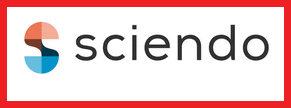Focus and Scope
Based on the decision of the Ministry of Education and Culture of the Republic of Serbian, number 07.030-053-50-11 / 13 of 06.03.2013. year, approved the registration of "Oikos Institute" doo Bijeljina in the register of publishers, numbered 383rd
Starting from the fact that most of the economic progress is based on innovation, ECONOMICS - Innovative and Economic Research Journal has focused primarily on knowledge economy and innovation. Only unpublished papers, that represent original scientific research, which contribute to the knowledge economy and innovation, are published in the journal.
The reason is very simple: nothing happens in the world economy without being fundamentally connected with technological changes. Innovation is a key driving force that accelerates all kinds of social changes. Innovations and changes within the fourth industrial revolution are the most famous in the world of new technologies that shape the global economic and technological structure, international and local markets, as well as the entire socio-cultural system.
However, this fact is not important only for the information, communication, and data processing field. Changes and innovations that come from technologies of clean energy, better quality and healthier food, preservation of human health, as well as improving the quality of people's lives are also very important. In addition, those changes and innovations that come from technologies for the protection of natural resources (water protection, forestry, green infrastructure, irrigation, and air protection) are modern, dynamic and innovative, such as information communication technologies. Innovation and new technologies play an equally important role in the complex of everything that makes up "new economy" such as: sport, music, creative and entertainment industries, social institutions and religious organizations, non-governmental organizations, and trade unions.
This journal covers the most consequences that technological change brings to the economy and society, but innovations are not reserved only for technology. Innovations can have social, media, cultural and socio-psychological character, and when they are not just strictly a product of information technology.
One of the projects of the Journal and the Institute is the annual international scientific conference, usually held in May, focused on the topic of "New Economy" https://oikosinstitut.org/category/arhiva-simpozijuma/ with the aim to highlight positive impact of modern technologies on the economy and society.
The general approach that we found to be legitimate and provocative enough for authors, readers and participants in our conferences is based on the thesis that innovation is eternal, multi-layered, unpredictable, and comprehensive in its economic, technological and cultural activities. Linking research and analysis of the impact of innovation, technological change and consequent structural changes in society, is a key "ecological niche" of our journal. For now, the readers and authors of the journal recognize that, and the original scientific-professional profile, we are striving for, is being formed. Our scientific and professional orientation has proven to be correct. This is confirmed by the fact that we have become globally available journal. We cooperate with all continents and regions in the world. The interest in reading and publishing in our journal stems from accelerating social changes. Crisis innovations and accelerated structural changes have become a part of new reality and "new normality" in the years of global or regional recessions, and the current Covid-19 pandemic conditions. We are facing a period of new challenges in which we expect a lot from innovation, from more effective vaccines, from new public health systems and lifestyles, and from the invention of some "now normality". Our modest contribution to that perception will be considered.
Rejection Rate
- 83,05% articles - completely rejected
- 16,95% articles - accepted for publication following mandatory implementation of modifications suggested by peer reviewers
Archiving
Sciendo archives the contents of this journal in Portico - digital long-term preservation service of scholarly books, journals and collections.
Plagiarism Policy
The editorial board is participating in a growing community of Similarity Check System's users in order to ensure that the content published is original and trustworthy. Similarity Check is a medium that allows for comprehensive manuscripts screening, aimed to eliminate plagiarism and provide a high standard and quality peer-review process.
April 2021. Petar Djukic, Editor in chief





















